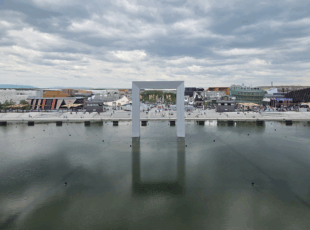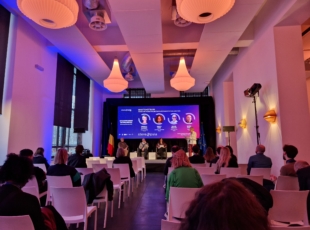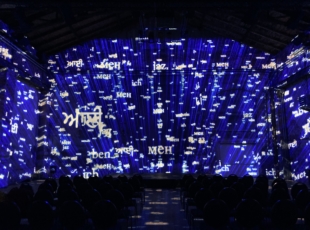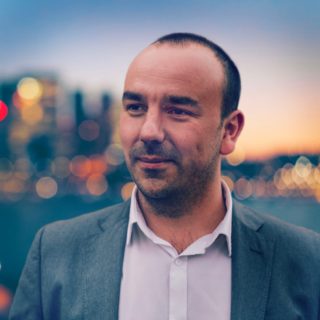Meet & Build at Charleroi: the Walloon and international gaming intersection

Article author :
Last October 24-26, Quay 10 in Charleroi welcomed the 9th edition of Meet & Build. Whilst it remains more low-key than major fairs such as GDC and Gamescom, the event organised by Walga is pulling in more and more crowds and is eliciting growing enthusiasm for Walloon gaming.
It is 10.00 in the morning; we pace up and down the Quays of Charleroi, the weather sun-filled yet chilly. It is our first visit to Quay 10, where Meet & Build is taking place. On the way there, our GPS informs us that ‘the place is busier than usual’. Once we arrive at the destination, it becomes clear why: even though it is early, the event is already in full swing.

Quay 10 accommodates a modern and welcoming brasserie, a cinema complex with several auditoriums, as well as a space dedicated to video games. We head for the brasserie, which is already lively. Some people are working on their laptops, but the majority are enthusiastically chatting to each other. This is entirely to be expected, since Meet & Build is first and foremost a place to meet and share, explains Laure Marlière, communications officer at Walga, the event’s organiser.
‘Meet & Build is a small event where you stay close to people, you try to build together. The words “Build” and “Meet” are the cornerstones of what we are looking to create. The aim is to construct something robust with all of the participants, and to sustain this relationship afterwards. It is really this aspect of a regular connection which is important. Our event is different from major fairs such as GDC and Gamescom, where the meetings are rapid, almost like on a production line, and where it is difficult to build lasting relationships. With Meet & Build, the emphasis is on developing a relationship of trust, almost intimate, between Belgian developers and the guests.’
Amongst the participants are numerous developers from the Walloon region. We for instance come across the Mystal Games team, an independent studio managed by Manihel Foucart, Joackim Foucart and Karima Jamil. Even though they are international event regulars, it means a lot to them to be here in Charleroi:
‘You mustn’t neglect events which are more specialised, more focused and more local, which can also be beneficial for small projects. They allow project owners to get to know one another and gain access to new opportunities. I think it is important to target both big and small events,’ explains Karima.
Manihel adds: ‘Meeting up like this also means Walloon studios get together, get to see each other and discuss our progress. It also puts us in touch with each other, as well as with other studios, partners, investors and publishers. It’s very important to have this type of event in Belgium.’

An event which attracts international actors
But Meet & Build is not solely a Belgian event. In the cinema auditoriums of Quay 10, numerous talks are moderated by video game developers, publishers and consultants with various backgrounds. Amongst the delegations attending are those from Japan – the pioneer country for video games –, Greece, Croatia and the Philippines.
Africa is also in attendance at Meet & Build. For a long time forsaken by the video game industry, the African continent, with its history and its culture, is nowadays increasingly making its presence felt.

But to integrate it requires an authentic approach, explains Jennifer Lufau, authenticity consultant for video game studios, having come here especially from Paris: ‘I think that Africa is the next major opportunity to be showcased in video games, because it is really underrepresented. It’s there to be made the most of, but it is vital to do so correctly. The fact is that the studios are lacking diversity in general, with few women and little diversity of origin. So, if you want to tell stories which come from other cultures, it is important to involve people who know the subject. You have to avoid misrepresenting these cultures, because it would be a shame to produce games which distort them.’
For her, this opportunity to get her message across in Belgium is a first. She says she has noticed that our country is slowly beginning to attract attention within the industry, even if though it still remains a minor actor:
‘I think I haven’t yet met enough Belgian delegations at the major video game events in France. They are there, but I have the impression that you don’t hear Belgium talked about enough in the industry. However, I know that there is a lot going on here, and that many opportunities are being developed in the video game industry.’

Wallonia, a flourishing gaming zone
And yet, the visibility of the video games studios is growing. For Corentin De Clercq, the founder of Little Big Monkey Studio, the expansion of Made in Belgium gaming is even undeniable. ‘Yes, these last few years it’s been developing pretty well, with projects being put together just about everywhere, training centres and specialised schools such as Albert Jacquard. We are seeing more and more small structures emerging. It also has to be acknowledged that Walga is better than ever at bringing all the studios under the same banner, and that’s fantastic. Jean Greban, who is behind it, has done a massive amount of work to establish contacts across the world and promote Walloon start-up studios.’
Whilst Walga is playing a central role in terms of visibility, platforms such as Wallimage offer precious support. Sophie Augurelle, the head of the gaming department, explains: ‘with the current crisis (over 30,000 job cuts in the global industry in the last two years), the influence of publishers has changed. Today, they are more cautious. The studios therefore have to come up with a plan B to fund their productions, which are often very costly.’
And studios in their early stages can rely on, amongst others, Wallimage for this essential support: ‘public funding has played a crucial role in this development. Over the last two years, we have supported projects which may never have got going without Wallimage’s aid.’



Progress to be followed up
This dynamic is nevertheless on hold following the recent elections, which have led to Walloon government grants being reviewed:
‘the grant we received for calls for projects up until this year were part of the Wallonia recovery plan, as were numerous other projects. The government has until the end of the year to decide which will be retained,’ explains Sophie Augurelle.
Despite this uncertainty, Walga is continuing to prepare the future of Walloon studios. Laure Marlière concludes: ‘our objective is to represent this sector as best we can. That involves our participation in international events but also local initiatives to bring together the Walloon developers. That includes regular gatherings such as Game Dev Cafés in Mons, the After Work Game Devs in Charleroi, as well as the Game Cafés in Namur and in Liège, where we also have several events planned. So, for the moment, taking a break is out of the question!’
Something to boost the visibility of Walloon gaming and, why not, enable a first game developed in Belgium to gain global recognition!
A story, projects or an idea to share?
Suggest your content on kingkong.
also discover

From Belgium to Japan, the new territories of creative digital creativity

Stereopsia, the key European immersive technologies hub

NUMIX LAB 2024: creating bonds and building the future of digital creativity


